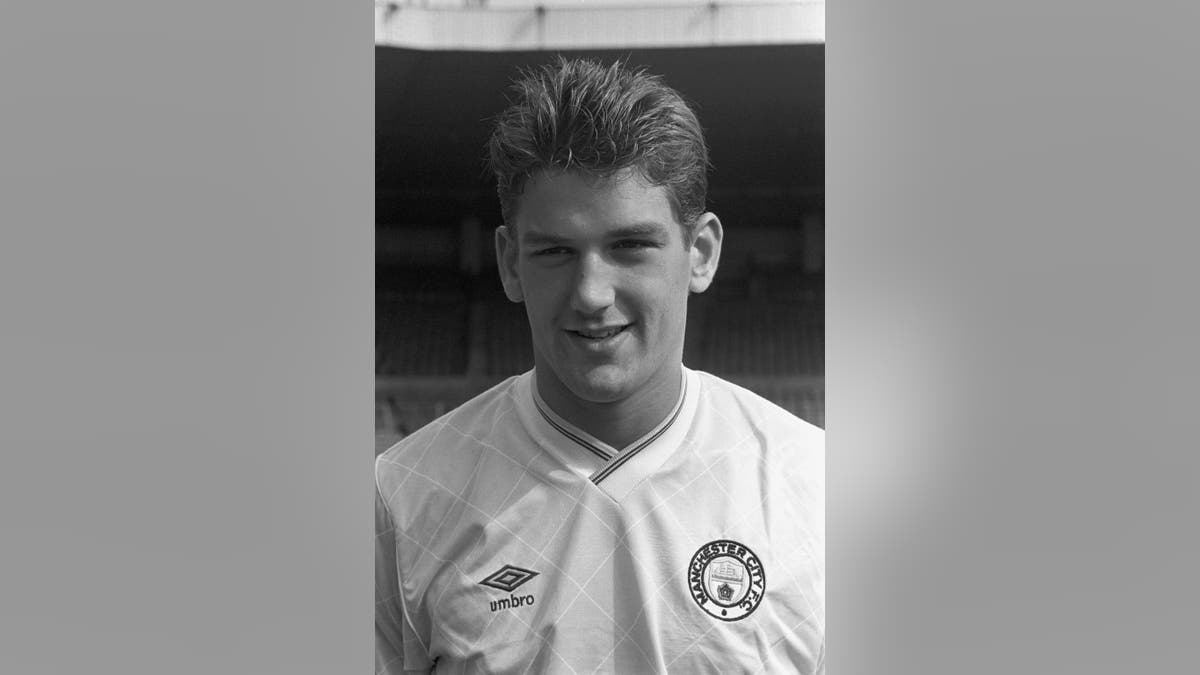
FILE - This is a Aug 20, 1987 file of former Manchester City soccer player David White. One by one former English soccer players who were subjected to years of sexual abuse by youth-team coaches are breaking cover to expose the game’s dark secrets. English soccer team Manchester City launched an investigation after former players David White and Paul Stewart who played for the club across the 1980s and 1990s and went on to feature for England, came forward with their stories of abuse. (PA, File via AP) (The Associated Press)
LONDON – Former English soccer players who were subjected to years of sexual abuse by youth team coaches entrusted with their care are breaking cover to expose the game's dark secrets.
Harrowing stories of assaults on young players by men they relied on to turn them into professionals are forcing authorities and clubs to finally address how child abusers were able to exploit their positions of power and why the behavior wasn't confronted earlier.
The abuses were first uncovered two decades ago with the conviction in the United States of English coach Barry Bennell, who coached at the academy of northern English professional club Crewe Alexandra, which was renowned as a center for turning raw talent into the complete footballer.
Andy Woodward, who went on to play for Sheffield United, testified in Bennell's 1998 court case but only revealed his identity two weeks ago in a front-page story in The Guardian newspaper.
Since then, other ex-players have been emerging to tell their stories of abuse at the hands of other coaches. The prospect of boys being turned into well-paid soccer stars meant that parents often handed over control of their children to football clubs and their coaches.
"My life has been ruined until the age of 43, but how many others are there?" Woodward said. "I'm talking about hundreds of children who Barry Bennell cherry-picked for various football teams and who now, as adults, might still be living with that awful fear."
Woodward's story gave other victims of Bennell and unnamed coaches the courage to come forward and compel authorities to end the inertia that surrounded the 1990s revelations.
"We're victims of a horrible, horrendous thing that happened in the early 80s and 90s," Woodward said after leaving a meeting with the English Football Association on Thursday. "Ex-players are suffering so much and suffered in silence for so many years. We went through hell."
Manchester City launched an investigation after David White and Paul Stewart, who played for the club across the 1980s and 1990s and went on to feature for England, came forward with their stories.
"The club is aware of allegations that Barry Bennell had an association with Manchester City Football Club in the 1980s," City said in a statement. "As a result the club is undertaking a thorough investigation of any past links he might have had with the organization."
City's response came 21 years after Bennell was first convicted in the United States. In Jacksonville, Florida, the Englishman pleaded guilty to six counts of custodial sexual battery in exchange for four years in prison. He had been charged with raping a boy and repeatedly sexually assaulting a player from a youth team he had escorted to the U.S.
After serving his sentence in the U.S., Bennell was convicted again in Britain — receiving a six-year sentence for 23 offences. The case received little publicity at the time. But Bennell was jailed for a third time in 2015 when he pleaded guilty to abusing a boy at a football camp in northern England in 1980, prompting a fresh examination of his crimes and potential abuses by other coaches. Bennell is not currently in prison.
"I believe there was a conspiracy and pedophile ring," Jason Dunford, a youth team player with Manchester City, told the BBC on Friday. "There were people at those clubs who had a duty to look after boys coming through their system."
A police force based near Crewe and Manchester said 11 people had contacted them already this week and the players' union is also addressing the torment suffered by their members.
"Because of Woodward's bravery many other ex-players and apprentices are now contacting us — it is double figures now — and that is a timely warning for everybody in football about our duty of care to these youngsters," Professional Footballers' Association chief executive Gordon Taylor said. "It is up to all of us now to grasp the nettle and make sure we learn from this.
"I want all players, even those who didn't make the grade, to feel that the PFA is a safe haven of support for them. We will help with counselling, treatment, whatever they need."
A children's charity has received a flood of calls since setting up a dedicated helpline for footballers in conjunction with the Football Association.
"These are heinous crimes and they need to be investigated by the police and they will get our support," FA chairman Greg Clarke said.
